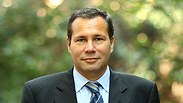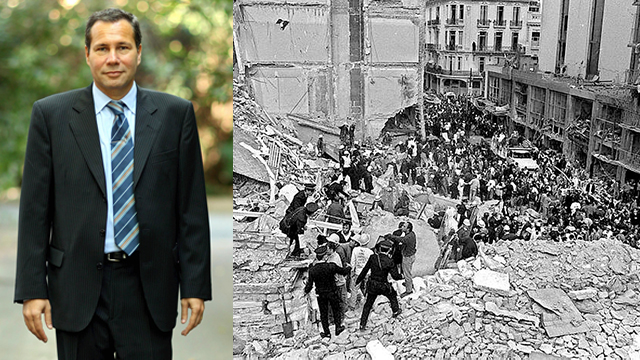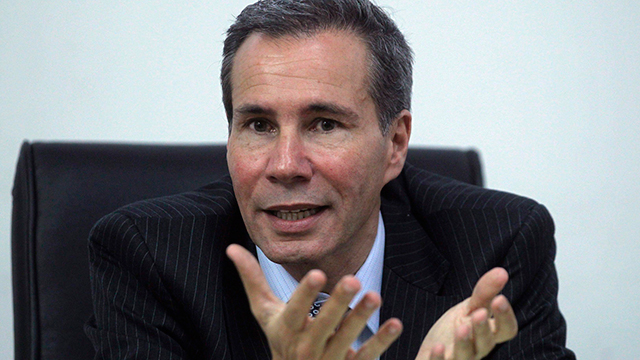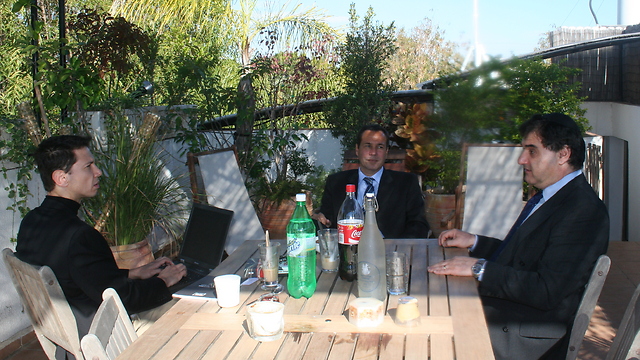
'Senior officials colluded to hide Iranian role in AMIA attack', Nisman told Yedioth in 2007
Argentine prosecutor probing deadly terror attack at Buenos Aires Jewish community center was determined to uncover the truth.
"I am the prosecutor and I have one role – to gather evidence, even if I won't be able to put even one man in the dock," Dr. Alberto Nisman told Yedioth Ahronoth in a 2007 interview.
Special Prosecutor Nisman was found dead on Sunday night, hours before he was due to testify over his claims that Argentine President Cristina Kirchner had covered up the Iranian role in the terror attack at the AMIA Jewish community center in Buenos Aires in 1994.
Nisman's body was found with a gunshot wound in the bathtub at his apartment in the upscale Puerto Madero neighborhood of Buenos Aires. He had been due Monday to participate in a closed-door congressional hearing surrounding his investigation into the perpetrators of the 1994 attack, which killed 85 people, and the ensuing cover-up about who was behind the bombing.
Nisman was at first appointed to aid two prosecutors leading the investigation into those responsible for the attack - the findings that ensued were troublesome. Namely, Nisman reportedly discovered that senior Argentine government officials were involved in a major cover-up of Iranian agents behind the attack.
Nisman was the first Argentine to openly speak of the alleged Iranian role.
"The most senior officials involved in the prosecution, members of the intelligence service along with my government conspired to disrupt the discovery of the truth about the Iranian connection and avoid bringing those responsible to justice," he told Yedioth.
Nisman's allegations, which had already led to a series of indictments against Argentine officials for obstruction of justice and perjury, cast a dark shadow in the Argentine political world.
Nisman was originally appointed to help two other prosecutors who were handling the case. After Nisman later began pointing fingers at top government officials, including the interior minister and president, he said: "They probably curse the day they came to me and asked for my help."
In September 2001, the trial began for 20 Argentines charged with helping carry out the attack. Nineteen of the 20 were policemen.
But evidence in the case collapsed after Nisman revealed a video recording that showed the investigating judge, Jose Galiano, offering one of the suspects a bribe in order for him to give testimony that would implicate the policemen.
Galiano was dismissed and all of the 20 suspects involved in the trial, who had denied the charges against them, were acquitted on September 7, 2004.
After the failed trial and the embarrassment that ensued for the prosecution, Nisman was appointed the role of special prosecutor heading the investigation by former president Nestor Kirchner – current president Kirchner's late husband.
Since his appointment in 2004, Nisman launched two ongoing investigations. The first investigation was aimed at finding out who was behind the attack and the second to reveal who was responsible for the cover-up.
"The attempt to dump the blame on the police officers comes from the will of the government not to directly deal with the Iranian regime, which is responsible for the attack," Nisman said in 2007.
"There is a connection between unstoppable politicians and the corrupt judicial system whose goal is to place guilt on those not responsible for the attack; (to do) everything to calm the rage in the Jewish community. Judge Galiano requested 400,000 dollars – some of which was used to incriminate police officers."
Nisman also collected testimony against the heads of the Iranian regime, based on incriminating evidence from former Iranian president Seyyad Abolhassan Banisadr, various diplomats, Iranian opposition sources, Iranian intelligence official Farhad Mesbahi and from heads of the Iranian operational network in Europe.
The latter's testimony was the most important card in presenting Nisman's evidence to the heads of Interpol and convince them that he had connected enough material that would incriminate the Iranian government leaders responsible for the attacks that took place in Buenos Aires.
In 2006, Nisman published his first report which blamed Iran and Hezbollah for initiating the attacks in Buenos Aires. In July of 2006, Nisman's report was transferred to the Mosad and the report was described as "courageous and professional." The report including thousands of pages of surveillance, wiretaps and intelligence analysis.
After the release of the report, Nisman turned to Interpol, managing to convince the agency to issue international arrest warrants for several key figures connected to the Iranian regime – among them former Iranian intelligence minister Ali Fallahian and senior Hezbollah member Imad Mughniyeh.
When asked if he believed he would succeed in bringing those guilty to justice, Nisman responded: "I am the prosecutor and I have one role – to gather evidence.
"I believe that today, with the evidentiary basis that we have brought, the trust in Argentina's prosecution has returned, and those who had no faith that we would be able to investigate an event that occurred so many years ago which so many tried to cover up, now think differently."













